- Home
- Michael McDowell
Katie Page 3
Katie Read online
Page 3
“Mrs. Drax, how much do you owe my uncle?” Henry Maitland asked in a light voice.
“Twenty-two dollars and a half,” replied Mary Drax, “but we have only sixteen of that.”
“Do you really believe that Mr. Varley would compel you to leave this house on account of six dollars and fifty cents?”
“Yes,” said Philo, “I do. I don’t care if he is your uncle. I think him a cruel man. Even if he allowed us to remain here, I would have to say that his treatment of Mother was shameful.”
Mrs. Drax made a vague movement, which was possibly meant to suppress her daughter’s too evident anger. To speak so of Mr. Varley before his own nephew!
“Miss Philo,” Henry said, reaching into his pocket, “here are ten dollars. That will make up what is wanted when Uncle Varley comes round tomorrow.” He held out a gold coin for her to take.
“Mr. Maitland!” cried Mrs. Drax.
Philo hesitated. Henry Maitland came toward her and placed the coin in the palm of her hand. “Take the money,” he said. “Ten dollars mean very little to me. They mean a great deal to you. I dislike,” he said, and laid an emphasis on the word that implied a kind of disgust, “to see a lady weep.” Philo looked quickly to her mother to see if she had understood Mr. Maitland’s deprecation of her hysteria. She evidently had not, for now there were but tears of gratitude in her eyes.
Philo wanted to be angry with this man who had come so unexpectedly and all unbidden to their rescue, for she was astute enough to see that though he might have felt compassion for Mary Drax’s plight he also felt contempt for her lack of self-control. But instead, Philo only felt ashamed of her mother’s want of strength and was hotly embarrassed that Henry Maitland had witnessed it.
He inclined his head slightly, as if in understanding. “Mrs. Drax,” he said, bowing politely in response to her confused and voluble thanks, “I was happy to be of service to you and your daughter.”
“We cannot accept the money,” said Philo in a low voice, holding out the coin. “We have never taken charity.”
“This is not charity. This is more in the way of amusement. I wish to see my uncle blocked. He behaved badly tonight, and I was ashamed to witness it. On the other hand I was glad that I was by, so that I might counteract his . . .” He searched about the entryway for a word. “. . . rudeness,” he brought out at last.
“You must allow us to pay you back then,” said Philo quickly.
“Very well. I’ll come by here tomorrow at ten with a little note of agreement for you to sign. But I warn you, Miss Philo, I shall charge you quite usurious interest.”
It was half an hour, after Mr. Maitland’s departure before the letter in Philo’s pocket was remembered. Mrs. Drax had talked that long of Mr. Varley’s threats and Mr. Maitland’s timely rescue. She now had a semblance of calm but this had been an evening of such surprises and reversals that she jumped at every noise. She wondered whether she ought not put off reading the letter until the morning.
“Mother, if Grandfather has not written in twenty-three years, it seems likely that this letter contains some matter of importance. Shall I read it aloud?”
Mrs. Drax nodded, for she was always persuaded by her daughter and had long given over argument as ultimately ineffectual.
Philo brought the candle and the knife while Mrs. Drax arranged herself in the chair for the receiving of momentous and likely very bad news.
But her – and Philo’s – first response to the letter was one of astonishment, for when Philo slit open the envelope, two folded ten-dollar notes dropped out and fluttered to the floor.
These Mrs. Drax turned over and over in her hands while Philo read aloud what her grandfather had written.
Chapter 4
THE LETTER
Parrock Farm
Goshen, New Jersey
March 20, 1871
Daughter Mary,
Because I have neither seen you nor answered your letters for twenty-three years, this missive must be opened by you in surprise. I hope that time and my supposed indifference have not withered the filial affection which was so marked an element of your early character and from which, for so many years, you have had such barren return. I have long hesitated to write to you, for I knew that when I did write it would be to beg not only your forgiveness but also your assistance.
I was wrong in abandoning you, but your marriage to improvident Mr. Drax at so tender an age and entirely contrary to my wishes and those of your mother set my heart against you. I foolishly attributed your mother’s wasting away to that wilful connection. Your brother James was my comfort in my bereavement, and I was soon convinced that I had but one dutiful and loving child. I purged you from my heart. This was wrong of me, but daughter Mary, if you knew the sorrow that has fallen upon me, you would forgive me the wrong I have done you. For truly I have been punished.
James and I lived alone and in contentment for fifteen years. Then, some five years ago, when I was on my way to Salem with a load of plums, a young man, driving his phaeton wildly down a too-narrow road, frightened my horse and overturned my wagon into a ditch. I fell beneath it and my legs were crushed. From that day I have been an invalid, and when I budge I am carried.
Shortly thereafter, James was married. He was thirty-seven years of age and not inclined to the conjugal estate. I am convinced that he married more for my sake than for his. His choice was worse than yours. James married a woman from Philadelphia called Hannah Jepson. Her father had been a fisherman and her mother sewed straw for a living. Hannah herself stunted poodles for the fashionable ladies of Philadelphia, which occupation she gave over when she came to live with us here on Parrock Farm.
From the very first I was not pleased with her. Mary, the Parrocks are plain country people – fair and honest and plainspoken, though we had always taken care that our children should be educated. The strength of a nation is founded in the literacy of its populace, and if some of our neighbors felt we were too “high-toned” for our station as mere farmers, I could only point to Mr. Jefferson who also was “a mere farmer.” But the Jepsons were another sort of family altogether – low, certainly, and possibly cunning. Hannah’s father, I hear, died in a brawl and her mother of drink. Hannah at first was taciturn although apparently complacent, but after the marriage her true character was not slow to reveal itself. She is unmannerly, hypocritical, avaricious, and ignorant – it pains me greatly to speak so of a daughter-in-law. She became imperious and demanding. James once told me he had married Hannah because she was such a strong woman and could help with the work here, but he was mistaken in her. She refused to leave the house when the sun was up and even required that we hire a girl to assist her in the kitchen. Needless to say, that girl does all the work. Within two years of James’s marriage to this woman, her ascendancy over our household was complete. Your poor brother would sit by my bed for hours with his head in his hands and beg my forgiveness for bringing that woman to Parrock Farm.
Nine months ago James died very suddenly. One night after supper he took ill, and the next noon he was dead. I asked Hannah to write to you, but I suspect she did not do so. Hannah said she feared contagion and James was quickly buried. For three months Hannah wore crape streamers on her bonnet whenever she went out, but so far as I could ascertain, those streamers were the length and breadth of her sorrow for James. One morning she went out without them, and when she returned at noon she informed me that she had married again.
John Slape, her new husband, I consider to be in every way Hannah’s equal. I do not know what he did for his livelihood before his marriage, but I would not be surprised to learn that he had spent time in prison somewhere. He has that sort of look about him. By his first wife, he has a girl called Katie, a dark-haired beauty some would say, but I think she has the devil in her. Slape and his daughter came to live on Parrock Farm. I would have liked to object to this incursion, but Hannah said that someone was needed to manage the farm and Slape would be b
etter than a paid overseer or set of rascally tenants.
I am served with a kind of grudging courtesy by my daughter-in-law and her husband, for they know I have money. I am prodded once a day to let be known the contents of my will, but this I have refused to do. In a weak moment I was persuaded to sign over the farm to the Slapes, but I was ill and had become convinced that I no longer wanted the trouble of it. From my window I see only the kitchen garden, and that is in such ill repair that I have not the heart to ask after the fields and orchards, which have always been the Parrock pride. Parrock apples were once asked for in Philadelphia and Camden and Trenton. Now the Slapes are trying to persuade me to settle upon them the remainder of my fortune. If I do, they say I need never again worry myself with matters of business and finance. But I know that if they had all my fortune they would not scruple to turn me out of doors, crippled as I am, without property or means.
When I see the hard-visaged Slapes whom I accepted and remember my darling daughter Mary whom I cast out, I am filled with bitterest remorse. I have had John Slape drive me into Goshen today, and I write this letter at my lawyer’s. I gave Slape to understand that I would discuss my testament with Mr. Killip, so he contented himself to lift me out of the bed and carry me downstairs and put me into the wagon. I am not the father you remember!
I have been ill now for several weeks with grievous trouble in my bowels. I have suspicions as to the origin of this illness, and someone less trusting than you reading this letter might have an inkling what those suspicions are. I have determined to try to fight these Slapes, and it is for this I ask your assistance. I want the loan of your daughter Philomela. Though I have never seen her, I have heard something of her, from whom I shall not tell you. I have a spy in New Egypt. Philomela, I am told, is of a strong, generous, frank nature. She is independent and resourceful, qualities not often admired in ladies, but qualities which have often distinguished the Parrock women. Philomela is, I am happy to hear, much more a Parrock than a Drax.
Daughter Mary, if you can spare Philomela and if she be willing to come to the aid of a grandfather who has hitherto ignored her existence, send her to me. Let her come to Parrock Farm in the guise of a servant seeking employment. Hannah has lately discharged a girl who was employed in the kitchen here, and her parsimony and short temper are so well known in this neighborhood that the position is in little danger of being shortly filled. I have a plan which, with Philomela’s help, might effect the restoration of Parrock Farm to the sad remnant of our family. If the Slapes can be turned out then I would beg you to join Philomela and me here, in the home of your birth and upbringing.
Your father, erring but repentant,
Richard Parrock
P.S. I enclose twenty dollars to defray Philomela’s expenses should she choose to come. In any case, please do not think of returning it. R. Parrock.
P.P.S. I have read this letter through twice and only fear that it may be dismissed as the querulous complaining of an old and infirm man whose reason has been unbalanced by his injuries and his grief. I have not misrepresented the infamy of the Slapes – in fact they are worse than I have painted them. And, what I hesitated to write before I will add now – I have begun to fear for my life. R.P.
Chapter 5
PHILO’S RESOLVE
“I will go to him tomorrow,” said Philo.
“No!” cried Mrs. Drax. “What could you do against such wicked people as that? Those terrible Slapes. My poor father!”
“Mother, he is in desperate need. His last words were, ‘I fear my life is in danger.’ He asks that I come, and how could I refuse?”
“It is dangerous,” said her mother. “Such a journey – alone. And such a mission!”
“Goshen is not three hours by the cars, I should think.”
“You have never travelled so far, Philo. You have never travelled alone.”
Philo paused, then when she spoke to her mother, it was with calmness and deliberation. “Mother, you are trying to put difficulties in my path because you don’t want me to go to Goshen. But here is Grandfather’s letter and he asks me to come to him. I intend to do just that, and it would not matter to me if he were in California – I would go all the same.”
Mrs. Drax shook her head. “It’s of no use to talk to you, I suppose.”
“No use at all,” Philo smiled, and embraced her mother. “Give me your blessing,” said Philo quietly, “and some kind message to take to Grandfather from you.”
“Tell him – tell him I know not what, Philo. I suppose tell him to leave those terrible Slapes and come to New Egypt. Our home is fearfully small, but he may be assured that he will always be treated with respect and honor and love by his only surviving child. Poor James. I knew he had married, but I had not heard that he was dead. Philo, this letter has been a sad blow to me. I have lost my brother!”
“But you may have regained a father,” said Philo comfortingly. “Mother, come upstairs and help me to pack my clothes. I suppose it is a good thing that I have not such a wardrobe as Jewel Varley’s after all – for then I should never be able to leave tomorrow. . . .”
“Philo,” said Mrs. Drax with some hesitation, “do you think that your grandfather has some deal of money? If the Slapes are resolved to kill him for it, I suppose there must be a deal of money—”
“Mother! This is not the reason I have chosen to go!”
“Of course not, Philo dear, but wouldn’t it be a fine thing if your grandfather came to live with us, or we went to live with him – without the Slapes there of course – and he happened to have some vast quantity of money!”
Philo was silent, and Mrs. Drax said nothing more but was already looking forward to the time when she might slip her needle into a fold of cloth and never pull it out again.
The following morning, Philo went early to the railway station and consulted a table of schedules. She found that she would be able to leave shortly past noon and would arrive in Cape May Court House, the town nearest Goshen on the line, about eight o’clock that evening. Her hope that the journey would require only three hours had been wholly unfounded. On the way back from the station, she was surprised and happy to fall in with Henry Maitland, who had stopped by the post office in hope of finding a recent newspaper or some periodical he had not yet read.
“Mr. Maitland,” said Philo, “I am very happy to be able to return your money.” She held out the gold coin to him.
He held up his hands and smiled engagingly. “Miss Philo, no! I had much rather have the pleasure of your I.O.U. Besides, the money is needed.”
“No longer,” she said. “Mother and I have the money for the payment on the mortgage and more besides. But we will always be grateful to you for your kindness.”
“Ah, you have discovered another benefactor then,” said Mr. Maitland. “I hardly think that polite, Miss Philo, for surely I presented myself for that position first.”
Philo blushed and explained: “My grandfather sent a letter yesterday which contained twenty dollars.”
“Ah! I see now. In that case,” said Mr. Maitland, “I suppose I must consent to the return of the ten dollars,” and he took the coin from Philo. “I must beg you, however, to apply to me in the case that this situation ever arises again. There is no need to wait until the night before a payment is due either. Sometimes the post is not so opportune.”
Henry Maitland begged the privilege of escorting Philo home, and she assented. The morning was warm and tasted more of the coming spring than it did of the passing winter. There were clouds in the west, but in the east the sun shone bright and unobscured.
“Will I see you and Mrs. Drax at Jewel’s come-out party, Miss Philo?” Henry Maitland asked.
“I think not,” smiled Philo. “Jewel’s list of guests is very exclusive.”
“I see,” said Henry thoughtfully. “I will speak to Aunt Caroline.”
“Pray don’t,” exclaimed Philo. “It will not make any difference, for I
could not go to Jewel’s party anyway.”
“Why not?”
“I am going away.”
Henry looked at her in surprise.
“My grandfather’s letter was also an invitation,” Philo explained. “I’m going to visit him in Goshen.”
“You are leaving soon?”
“In a few hours.”
“I am sorry, Miss Philo, I—”
Just then, as they were passing the larger of New Egypt’s two stores, Jewel Varley stepped out the door and into the street, nearly colliding with them. “Lord!” she cried. “Watch out, Philo!” Then she saw that Henry Maitland was with her friend, and she was astonished into silence.
“Jewel,” said Henry Maitland, with a small, courteous inclination of his head.
Jewel was dressed in the very teeth of fashion, but her outfit might have appeared to better effect on the upper reaches of Fifth Avenue in New York than in the miry lanes of New Egypt. “Cousin Henry,” said Jewel, staring hard at Philo all the while, “what on earth are you doing here with Philo Drax?” Her tone of voice was no compliment to the supposed worth of Philo’s company.
“Miss Philo is pointing out to me all the sites of historical and social interest in New Egypt,” replied Henry, unperturbed by Jewel’s rudeness.
“Do you know one another?”
“Your father and Mr. Maitland visited our house last evening,” said Philo with a polite smile.
“And you went inside?” wondered Jewel.
“If you imply that Mother and I would keep Mr. Maitland on the doorstep, Jewel, you are mistaken in your view of our hospitality.” Philo was disposed to enjoy Jewel’s discomfiture, which was evident.
“I am escorting Miss Philo home now, Jewel.”
“This is outrageous,” said Jewel angrily, and kicked her little leather boot in the dirt of the street. “Mother will be beside herself. Mother has invited the best people in the town to be introduced to you this forenoon, Cousin Henry, and when she hears that you have gone to the Draxes’—”

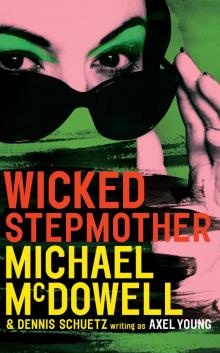 Wicked Stepmother
Wicked Stepmother Blackwater: The Complete Caskey Family Saga
Blackwater: The Complete Caskey Family Saga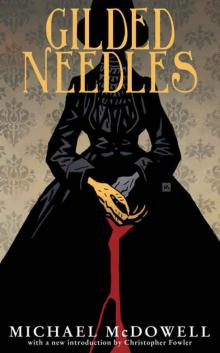 Gilded Needles (Valancourt 20th Century Classics)
Gilded Needles (Valancourt 20th Century Classics)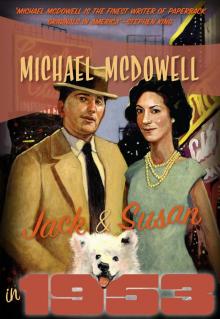 Jack and Susan in 1953
Jack and Susan in 1953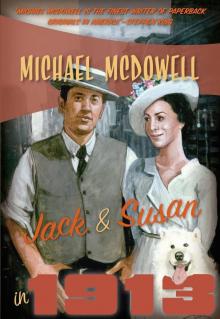 Jack and Susan in 1913
Jack and Susan in 1913 Rain
Rain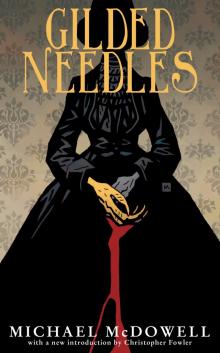 Gilded Needles
Gilded Needles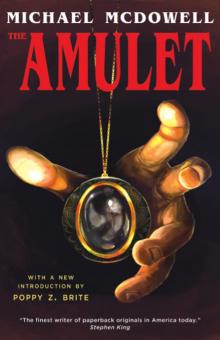 The Amulet
The Amulet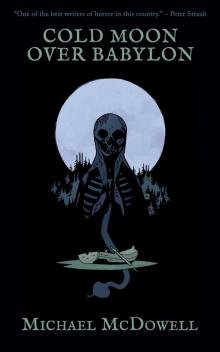 Cold moon over Babylon
Cold moon over Babylon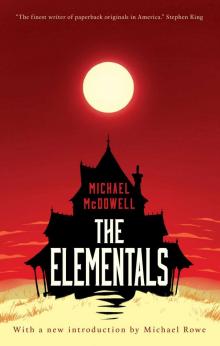 The Elementals
The Elementals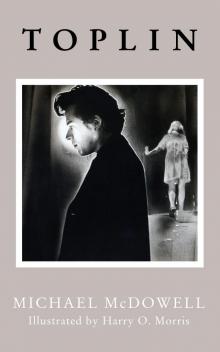 Toplin
Toplin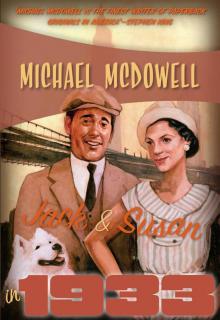 Jack and Susan in 1933
Jack and Susan in 1933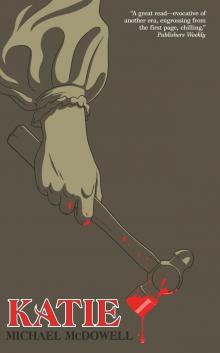 Katie
Katie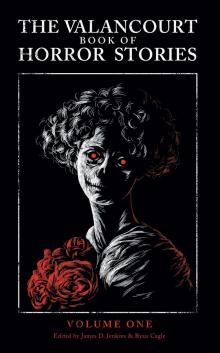 The Valancourt Book of Horror Stories
The Valancourt Book of Horror Stories